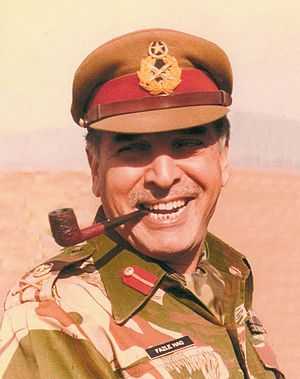Fazle Haq
| Fazle Haq HI(M) HPk | |
|---|---|
 | |
| 14th Governor of North-West Frontier Province | |
| In office October 11 1978 – December 12 1985 | |
| President | Muhammad Zia-ul-Haq |
| Preceded by | Abdul Hakeem Khan |
| Succeeded by | Abdul Ghafoor Khan Hoti |
| Caretaker Chief Minister of North-West Frontier Province | |
| In office May 31, 1988 – December 2, 1988 | |
| Prime Minister | Benazir Bhutto |
| Governor | Amir Gulistan Janjua |
| Personal details | |
| Born | Fazle Haq 10 September 1928 Mardan, North-West Frontier Province, British India |
| Died | 3 October 1991 (aged 63) Mardan, North-West Frontier Province, Pakistan |
| Awards | Hilal-e-Imtiaz(Military) Sitara-e-Basalat Hilal-e-Pakistan |
| Military service | |
| Nickname(s) | General Fazle Haq |
| Allegiance | |
| Service/branch | |
| Years of service | 1951-1988 |
| Rank | |
| Unit | 70th Guides Cavalry-Armoured Corps |
| Commands | 6th Armoured Division 7th Infantry Division XI Corps |
| Battles/wars | Indo-Pakistan War of 1965 Indo-Pakistani War of 1971 Soviet War in Afghanistan |
Lieutenant General Fazle Haq, (Urdu: فضل حق; HI(M), HPk(10 September 1928 - 3 October 1991)), was a high-ranking general in the Pakistan Army, and the former Martial Law Administrator (MLA) of Khyber-Pakhtunkhwa province of Pakistan. He was the "Corps-Commander" of the XI Corps, and commanded all the Pakistan Army assets assigned in the Khyber-Pakhtunkhwa Province. He commanded the Combatant brigades, and supervised the clandestine covert network during the Soviet war in Afghanistan. He was one of the leading generals who led the Pakistan Combatant Forces during the Soviet war in Afghanistan. As Military Administrator, he had set up a network of training of the Afghan mujahideen. Under his command, the elements of Pakistan's administrative XI Corps participated in numerous operations against the Soviet Union.
He served as a Chief Military Administrator (Governor) throughout the military dictatorial rule of General Muhammad Zia-ul-Haq from 1978 till 1985 and also served as the caretaker Chief Minister of the province in the later half of 1988.
Army career
As an army officer, Fazle Haq was commissioned in the Guides Cavalry (Frontier Force) regiment of the Armoured Corps. He was instructor at Pakistan Military Academy in 1953-54 at the rank of Captain. During the Indo-Pakistani War of 1965, then Major Fazle Haq was part of the Guides Cavalry in the 6th Armoured Division, when the regiment launched a two squadron attack at Phillaurah on 11 September. The attack was targeted against the Indian 1st Armoured Division, and as a result both sides faced heavy casualties. This was presumed a Pakistani victory, as the fighting did not resume until 13 September, as the enemy was more cautious. However, it was a Pyrrhic victory.[1]
As a Lieutenant-Colonel, Fazle Haq commanded his own regiment, the Guides Cavalry during 1968 and 1969. Then by 1975, as a Major General, he took over the 6th Armoured Division stationed at Kharian.[1] Now promoted to Lt Gen, Haq was the commander of XI Corps at Peshawar from January 1978 to March 1980. By this time, General Zia-ul-Haq had imposed a martial law in the country, and Fazle Haq was concurrently appointed the Governor of Khyber-Pakhtunkhwa. After retirement from the army in 1980, he stayed on as the governor, finally relinquishing the charge in December 1985 when the martial law was lifted in the country. During his time as Governor and Corp commander he was considered one of President Zia-ul Haq's closest confidantes and a key architect of the Afghan mujahidin groups.He was actively involved with Afghan mujahidin groups including the Haqqani group and Gulbuddin Hekmatyar till the end of the Soviet-Afghan war and often met with High ranking CIA and government officials including Attorney General of the United States William F. Smith and other political key figures for funding and support for the Afghan Freedom. He remains to this day well respected and well known among the people of Khyber-Pakhtunkhwa for services rendered during his tenure as Governor.
Family
Fazle Haq has three sons and one daughter. All are well educated and highly qualified. Despite of his such fame as a great politician and as a 3-star general, none of his family members are associated with Pakistan army or in politics.
Political career
He was elected to the Senate in 1988 after completion of his two years bar from election after retiring from the army. He contested and lost the 1988 general elections from his home town of Mardan. He however won election from Kohistan. In the next elections, he won from Malakand with an overwhelming majority and remained a member of NWFP provincial assembly till his assassination in 1991. He also remained as caretaker Chief Minister of NWFP from May 31, 1988 till December 2, 1988. On 3 October 1991, he was assassinated by an unknown assailant allegedly in retaliation for the death of a senior shia cleric. he was buried in Peshawar( Cantonment Board Graveyard warsak road Peshawar Cantt)[2]
References
- ↑ 1.0 1.1 A.H. Amin. "Interview with Brig (retd) Shamim Yasin Manto" Defence Journal, February 2002
- ↑ PESHAWAR: Court indicts outlaw in ex-governor murder case(November 15, 2001 ) DAWN newspaper. DAWN group
External links
| Political offices | ||
|---|---|---|
| Preceded by Abdul Hakeem Khan |
Governor of Khyber-Pakhtunkhwa 1977 – 1985 |
Succeeded by Nawabzada Abdul Ghafoor Khan Hoti |
| Preceded by Arbab Jehangir Khan |
Chief Minister of Khyber-Pakhtunkhwa 1988 |
Succeeded by Aftab Ahmad Sherpao |
| ||||||||||||||||||||||||||||||